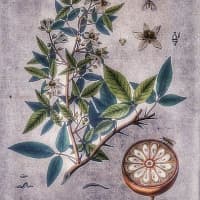The Bael Fruit comes from a species of tree (Aegle marmelos L.) native to the Indian subcontinent and Southeast Asia.
Also known as Bengal quince, golden apple, Japanese bitter orange, stone apple or wood apple.
Composition
- The bael tree contains furocoumarins (Note: Furanocoumarins, or furocoumarins, are a class of organic chemical compounds produced by a variety of plants. Many furanocoumarin compounds are toxic.)
- Including xanthotoxol and the methyl ester of alloimperatorin
- The bael tree fruit contains coumarins such as marmelosin (also known as imperatorin)
-Flavonoids
- Rutin and marmesin
- Essential oils
- Alkaloids
- allocryptopine
- O-isopentenylhalfordinol
- O-methylhafordinol.
- Aegeline (N-[2-hydroxy-2(4-methoxyphenyl) ethyl]-3-phenyl-2-propenamide) is a constituent that can be extracted from bael leaves.
Aeglemarmelosine, molecular formula C16H15NO2 [α]27D+7.89° (c 0.20, CHCl3), has been isolated as an orange viscous oil.
Preparation
The fruit can reach the size of a large grapefruit or bigger. The shell is hard and must be cracked with a tool. The fibrous yellow pulp is very aromatic, described as tasting of marmalade and smelling of roses.
The fruits can be eaten fresh or dried, into pulp powder or nectar. If fresh, the juice is strained and sweetened to make a drink similar to lemonade.
The leaves and small shoots are eaten as salad greens.
The leaves, bark, roots, fruits, and seeds are used in traditional medicine.
Healing Properties
Antioxidant
A rich source of antioxidants.[1]
Herbal tea prepared with dried bael fruits is a rich source of water-soluble phenolic compounds with demonstrated potent antioxidant activities.[1:1]
Disease / Symptom Treatment
Diabetes
May help control the complications of type 2 diabetes.[1:2]
Bael fruit tea tested in this study was found effective in increasing plasma antioxidant activity with the potential of reducing oxidative stress and help controlling secondary complications of type 2 diabetes and maintaining health and wellness.[1:3]
Title: Phenolic antioxidants of bael fruit herbal tea and effects on postprandial glycemia and plasma antioxidant status in healthy adults
Publication: International Society for Nutraceuticals and Functional Foods: Journal of Food Bioactives
Date: September 2020
Institution(s): Wayamba University of Sri Lanka; University of Chile; Memorial University of Newfoundland, St. John’s, NL, Canada
Archive ↩︎ ↩︎ ↩︎ ↩︎
